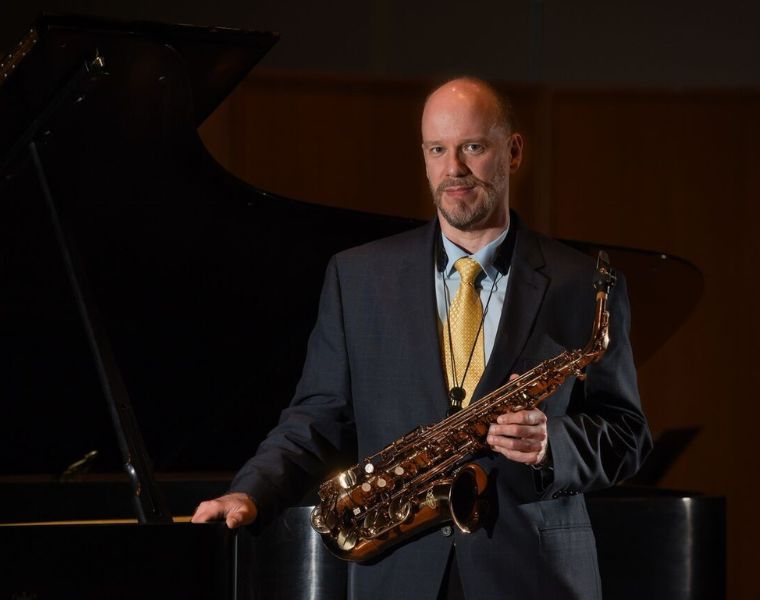As a professor of saxophone and chamber music in the Joint Music Program between the Cleveland Institute of Music and Case Western Reserve University, Greg Banaszak has spent more than three decades nurturing the talents of his students in classical and jazz genres.
But Banaszak’s influence goes far beyond the university community—he regularly takes the stage at Cleveland’s iconic Brother’s Lounge, the city’s historic jazz club, and travels across countries and continents to perform with orchestras and in concert halls worldwide. And his influence is even seen nationwide as a voting member of the Grammy Awards Committee.
The Daily sat down with Banaszak to learn more about his journey and how he’s evolved throughout his career in CWRU’s Department of Music.
Answers have been lightly edited for length and clarity.
Q: What do you enjoy most about being a traveling saxophonist?
A: I enjoy arriving at my destination safely. There’s so many daunting logistical situations as far as traveling goes, but at the end of the day, if I pass through customs and arrive safely and my instrument and luggage are in hand, that’s great. Every tour is a different experience.
There was one point that I was traveling almost exclusively, going on the road touring for three months. So I played with the Cairo Symphony in Egypt three times and the second time, my luggage didn’t arrive. It was stuck in Charles de Gaulle airport in Paris. The orchestra was so kind that they put together a tuxedo that would work for me. Meaning the bass player gave me his pants, the violinist gave me the shirt. So I felt a little kind of like a patchwork doll. But it all worked in the end.
Q: From where do you draw inspiration? Who/what were your influences growing up?
A: I grew up in a pretty musically driven area in Buffalo, New York, in the late 70s and 80s. So there were people like Grover Washington Junior as a saxophonist, Spyro Gyra, Buddy Rich, and The Woody Herman Big Band.
I was really fortunate to see, as a young man, that people were making a good living performing. It wasn’t something unheard of when I was a freshman. It’s not as much like that anymore, but was a really fertile and fruitful time to grow up—from a musical standpoint and during that time period.
Q: What countries have you performed in throughout your career? And do you have a favorite?
A: They’re all great. I was really fortunate because I brought classical or castro saxophone to, I think, three or four countries that had never heard it before. So the first was Egypt, and then India, Korea and I toured with the Berlin Philharmonic; they never had a saxophone soloist. It was just from one performance began another performance, and another.
I taught and performed in Korea a lot. So I really like Korea because I could go there for a month at a time and then I would teach in the summers. Egypt was breathtaking because, I mean, I couldn’t believe I was playing by the pyramids.
Q: How did you become a voting member of the Grammy Awards Committee?
A: I had a Grammy Award nomination for an album I did in 1999 and the president of the Grammy Award Committee just thought it was interesting that someone released a CD of saxophone concertos with an orchestra and that’s pretty difficult to do. That’s how it came to be.
And they said, “We would like you to join because you have a different perspective as an educator.” When he first called, I just thought it was a joke. I thought it was one of my friends that said, “Yes, you’ve been nominated.” So I was nominated in 1999 for best album of the year—solo instrumentalist and ensemble was the category. It was just nice to be nominated, but I didn’t win. I thought the outcome of it was much better because for 20 years, I’ve been able to coexist and cohabitate with these A-list artists.
Q: What’s your favorite part about teaching at CWRU?
A: I’ve been at CWRU for more than 30 years. My favorite part is definitely the students because they are so dedicated and hardworking. Most of my students are double degree majors and I think that’s really good because you don’t have to put all your talents into one basket of music; you should take a business class, to know how to market yourself within music, or some engineering classes, to know how audio engineering works.
Q: What makes music education at CWRU unique?
A: I feel it is my friends and colleagues, for we all are dedicated to creating a world class and personalized educational experience for our students. Our ensemble directors, including Kathleen Horvath, director of orchestral studies, Ryan Scherber, director of bands and Paul Ferguson, director of jazz studies, are exceptional educators, and individuals that always go the extra mile to assist all of our students, which is the mark of true educators. Many times, my colleagues will arrive early to campus to assist a student or an ensemble. Within our chamber music offerings Lisa Boyko, violist with the Cleveland Orchestra, leads our string chamber music division and I currently manage our mixed chamber music ensembles as well as a wonderful saxophonist and flutist, AJ Kluth has been directing our pop/commercial ensembles.
There is a great deal of hard work that may go unnoticed that takes place daily and weekly behind the scenes by our department staff, Jennifer Wright manages our department, which is no small undertaking, Laura Stauffer handles our business operations brilliantly, Percussionist and alumnus Nicholas Strawn is our new facilities coordinator, which is a demanding position to insure ongoing operations, and of course David Rothenberg, who is our department chair that leads our dedicated faculty and staff. And, dean and concert pianist, Sean Schulze vibrantly maintains our world class relationship with Cleveland Institute of Music.

